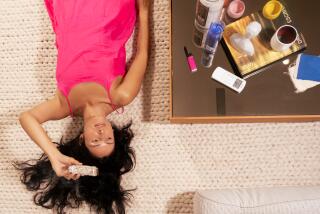PRIVATE FACES, PUBLIC SPACES : Piercing the Skin, Avoiding the Pain
- Share via
Larissa Zabolotnaya-Yang practices the ancient arts of acupuncture and homeopathy on Fairfax Avenue. She works among massage therapists, chiropractors and gym-hardened clients with energetic faces from which stress and pain have been banished--only to appear in aching backs, sour stomachs and chronic constipation.
Larissa has always been quick and clever. It was how she got to Leningrad University and to work with schizophrenics at the Bechterev Institute. She has learned how a successful American woman of 40 should look: glossy, in loafers and natural fibers, a crowded appointment book in hand. She has come to seem what she must always have been: independent, proud and just cautious enough.
She is frugal, not wanting to buy a house, to overstretch--just as she once kept her anti-Soviet views within the safety of her home or her mentor’s office. She arrived in America with little English, $200, a small son and one contact name. “It’s not what happens to you in life,” she says, “it’s how you react.”
Sometimes, she remembers her mother’s garden in Pavlovsk: two acres of flowers, of colors and scents and vegetables. Other times, she remembers tales of the last World War, of her mother’s flight deep into the forest, where she hid for two years. Her mother is is nearly 60 and full of rheumatism, a legacy of the damp, hungry war years. She is still in Russia. “Women there get very old very, very quickly.” She talks of her mother’s fears of traveling alone to Moscow for a visa. Distance and separation have many faces and many excuses.
Larissa has left behind her history--her parents, husband, profession, a system she knew. She left for her son, 3 then, 16 now. “I could not keep him safe any longer. I was already saying, ‘no, no, no, don’t say such things in your kindergarten.’ ” Her father gave her money for tickets and visas. She was his only child and he never saw her again. “He was an exceptional man with a big, sweet heart. When he died, I was ill for a year.”
Her husband, a mathematician, was too frightened to leave Russia. “I was stronger than he. I said, ‘This is my child, he came out of my body. I have the right to take him.’ ” By the time her husband applied for a visa, it was too late. It was refused.
She found a small apartment in Los Angeles, a secondhand car, a series of “little jobs.” Her psychotherapy degree, her fluent German--shut away with the past. She has not remarried. “I was afraid to let any man into my life because of my son. I wanted us to be unique.” She fell in love instead with Chinese medicine, with the delicacy of the needles, the stillness of healing.
“When I read about it, I cry sometimes because it is such a beautiful medical discipline,” she says. “I am filled up with healing energy like a plum.” When she took American citizenship, she changed her name legally: homage to the ancestors of others.
And so she lives with all the contradictions of flight and survival. She who left a country for her son now sits alone and knows that he minds that they are “poor.” “I told him, ‘I consider myself very rich. I have a wonderful education from Russia. And I gave you a wonderful opportunity to be whatever you want.’ ”
For a while, she wanted to live in Santa Barbara but her patients begged her to stay. Their need has touched her. She calls them “family” and tries not to think of the mother, a Jew, alone and aging in a turbulent Leningrad, or of the man who lost his only daughter, the husband who lost his only son.
A woman who refused to serve a system in Russia has learned service in West Hollywood. She talks of the Soviet system: thinking one thing, saying another. “Always double thinking there. Like in America: You always have to smile, whether you mean it or not.”
The needle’s sting.
More to Read
The biggest entertainment stories
Get our big stories about Hollywood, film, television, music, arts, culture and more right in your inbox as soon as they publish.
You may occasionally receive promotional content from the Los Angeles Times.










